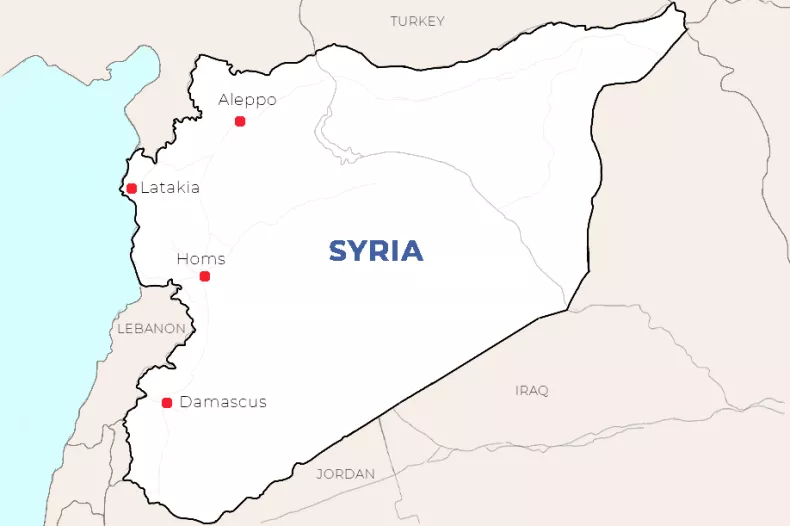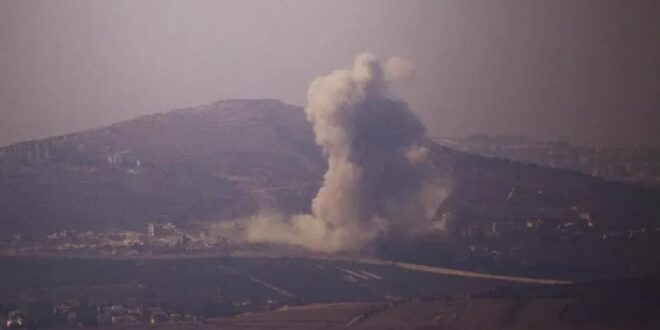Syria’s military has accused Israel of a targeted strike against its coast city of Latakia, 60 miles to the north of Lebanon.
According to Syrian military sources speaking to The Associated Press, two civilians were wounded and a military post was damaged. The attack is the latest example of how the conflict is being fought beyond the borders of Lebanon, where Israel began a ground invasion at the beginning of the month to destroy the Iran-backed Hezbollah militant forces that threaten its northern cities.
Israel has previously targeted military sites in Syria that it says are linked to Iran and to Hezbollah and has severely increased its operations against Hezbollah in recent weeks, after a year of near-daily exchanges of cross-border fire.
On Thursday the chief of Iran’s paramilitary Revolutionary Guard repeated his threat to Israel to launch more missile barrages if it strikes Iran.
“Do not repeat your mistake—if you misbehave, if you strike anything of ours either in the region or in Iran, we will again hit you painfully,” said Gen. Hossein Salami.

Lebanese media reported a series of heavy airstrikes overnight on Thursday near the country’s eastern border, with seven strikes targeting the town of Al-Khiam within a 10-minute span shortly after midnight, according to Lebanon’s National News Agency. In contrast, Beirut experienced a quiet night compared to the past week, with drones and jets flying overhead but no reported attacks since the previous morning. Despite the relative calm in the capital, the situation highlights the escalating military activity near the border while Beirut still remains on high alert.
The Lebanese Health Ministry reports that over 2,300 people have been killed in the past year, with 77% of public schools out of service due to their use as shelters or being in war zones.
The current conflict in the Middle East was sparked when Hamas militants breached Israel’s security on Oct. 7, 2023, killing around 1,200 civilians and abducting 250 more. Israel’s subsequent offensive in Gaza has resulted in over 42,000 Palestinian deaths, devastated large areas, and displaced 90% of Gaza’s 2.3 million residents, according to health authorities.
DNA Tests Underway to Confirm if Hamas Leader Yahya Sinwar Was Killed
Israeli officials are conducting DNA tests to determine whether one of the militants killed in a ground operation in Rafah, Gaza, was Yahya Sinwar, Hamas’ top leader, reports AFP. It is further reported that visual evidence suggests Sinwar may have been one of three militants killed in the operation. Israel has Sinwar’s DNA on file from his time in prison, and testing is currently in progress to confirm the identity of the body, according to reports from Israeli army radio and security officials, states the report.
Israel Investigating Possible Death of Hamas Leader Yahya Sinwar
The Israeli military announced Thursday that it is investigating whether Hamas’ top leader, Yahya Sinwar, was killed in a recent military operation in Gaza. While three militants were confirmed dead in the operation, the military has yet to verify their identities and is exploring the possibility that Sinwar was among them. Sinwar, a key figure in planning Hamas’ October 7, 2023, attack on Israel, became the group’s leader after the July assassination of Ismael Haniyeh in an Israeli airstrike in Tehran.
Israeli Strike on Gaza School Kills 15
An Israeli airstrike on the Abu Hussein school in Jabaliya, northern Gaza, killed at least 15 people, including five children, according to Gaza’s Health Ministry. The school, sheltering displaced civilians, was hit as part of Israel’s ongoing military operation in the region. Israel stated that the strike targeted Hamas and Islamic Jihad militants using the school as a command center. Dozens were wounded, with many in critical condition, as nearby Kamal Adwan Hospital struggled to treat the casualties. Verification of Israel’s claims regarding militant presence is still pending.
Israeli Airstrike Kills Hezbollah Commander Near Lebanese Border
The Israeli military announced Thursday that it had killed a Hezbollah commander, Hussein Awada, in an airstrike on the southern Lebanese town of Bint Jbeil. Awada was allegedly responsible for launching projectiles into Israel from the area. This follows a series of Israeli strikes that have targeted and killed Hezbollah leader Hassan Nasrallah and several senior commanders. Israel also issued warnings for residents to avoid two buildings in the Bekaa Valley, which have been hit by numerous airstrikes in recent weeks.
U.S. B-2 Stealth Bombers Strike Houthi Underground Bunkers in Yemen
American B-2 stealth bombers launched airstrikes early Thursday targeting underground bunkers used by Yemen’s Houthi rebels, according to U.S. officials. The strikes hit five weapons storage sites in Houthi-controlled areas, including locations near Yemen’s capital, Sanaa, and the Houthi stronghold of Saada. The Houthis, supported by Iran, have been attacking ships in the Red Sea amid the Israel-Hamas conflict. U.S. Defense Secretary Lloyd Austin confirmed the strikes as part of ongoing military efforts and a warning to Iran. Damage assessments are still pending.
UNIFIL Accuses Israel of Firing at Peacekeepers’ Watchtower
The United Nations peacekeeping mission, UNIFIL, reported that Israeli forces fired at their watchtower in southern Lebanon near Kfar Kila, damaging the tower and destroying two cameras. In a post from UNIFIL’s X account, it stated “This morning, peacekeepers at a position near Kafer Kela observed an Israel Defense Forces (IDF) Merkava tank firing at their watchtower. Two cameras were destroyed, and the tower was damaged. Yet again we see direct and apparently deliberate fire on a UNIFIL position.”
This follows a series of incidents involving Israeli troops, including forcibly entering a UNIFIL position and firing smoke rounds that caused injuries to peacekeepers. UNIFIL urged all actors to respect U.N. personnel and property, emphasizing their obligation to ensure the safety and security of peacekeepers at all times.
 Eurasia Press & News
Eurasia Press & News



